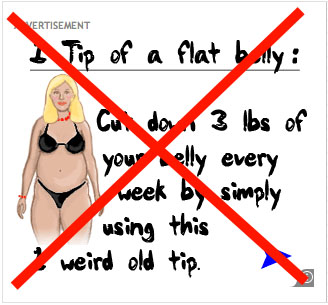5 Simple Ways To Spot Weight Loss Scams

If you’ve spent any amount of time on the internet, watching tv – or, really, living in the modern world – you have probably encountered your fair share of these.
They bombard you from all angles, with their glossy promises and quick fixes.
Yes, I am talking about weight loss scams.
And there are literally 1000s of them – preying upon the millions of people who desperately want to lose some weight.
As you could imagine, these scams are frustrating for those of us in the fitness industry that care about providing useful, actionable weight loss information.
And I am certainly not so naive to think that these scams will ever disappear for good…
The FTC, who is in charge of policing these scams here in the United States, is constantly engaged in a frustrating game of whack-a-mole with these unscrupulous snake-oil salesmen.
But, just like that carnival game, whenever you whack one down another will quickly pop up to take its place.
So how can you avoid these pervasive – and often fairly convincing – weight loss scams?
The answer to that is simple: education.
When you know what to look for, you are much less likely to be suckered in by their empty promises.
This article will cover the 5 most reliable ways that we’ve found to determine whether a weight loss product is legit – or if it’s simply trying to part you from your money.
1) Does it offer ‘1 weird trick’?
One of the most common strategies for these scammers is to play upon people’s curiosity.
To do this, they’ll run ads promising “1 weird trick to lose weight”, or variants of this phrase.
And unfortunately this tends to work extremely well!
People are always searching for some groundbreaking, revolutionary – yet simple – solution to losing weight.
The scammers have provided this in the form of Acai Berry Pills, African Mango, Pure Green Coffee, etc
Usually, there is some element of truth to the claims, which is what makes them so convincing.
That is, there is some study, somewhere, that suggests that these particular things may have an impact on weight loss.
So the scammers take that little tidbit, gloss it up, pay some B-grade celebrity for a fake endorsement (I’m looking at you Kim Kardashian) – and then package it as a miracle weight loss solution that doesn’t require dieting or exercise to work.
The bottom line here is that any product that follows this formula is a complete farce.
Nothing that comes in a bottle, relying on some trumped up gimmick, is ever going to be the solution you’re looking for.
I’m sorry, I wish I could tell you otherwise – but if you truly want to lose weight, it is going to come down to a combination of diet, exercise, and potentially smart supplementation.
That is the cold, honest-to-god truth.
2) Does it make specific promises?
This is a very common one, and should raise your red flags every time you see it.
Basically, whenever you see a weight loss product making specific claims about how much you’ll lose in a specific period of time, you should be wary.
And that is not to say it is impossible for people to lose weight in some of these timeframes.
It happens all the time: people that get their diets in order, start exercising properly, and are able to drop pounds of weight each month.
However, the problem is that these promises are one-size-fits-all!
Losing 8 pounds of fat in a month is viable when you are at a pretty high level of body fat.
When you are at a lower level, however, this would be almost impossible.
How can these products hope to know your specific situation, and how much weight you can feasibly lose?
They can’t – so when they throw specific weight loss promises at you, you are simply being fed a lie.
3) Does it claim to reduce fat from certain areas of your body
Spot fat reduction is a complete myth, yet many products use this claim in their marketing.
Trust me, the latest fitness product that claims to be able to target that stubborn midsection, or help you lose fat from your thighs, is completely full of shit.
When you lose fat, you don’t determine which parts of your body you lose it from.
You can’t target fat loss from your abs, or anywhere else for that matter…
If you want to lose fat from a specific part of your body, you’ll need to lose fat everywhere.
And no new-fangled ab belt, sit-up contraption, or pill is going to change that fundamental truth.
4) Does it make weight loss seem effortless?
Look, the reality is that losing weight takes some work.
It isn’t effortless, and it often requires a lifestyle shift in order to happen.
However, the truth isn’t nearly as sexy as the promise of sitting on your coach, eating doritos, and watching the fat just melt away.
You can lose weight – and you can do it without spending hours in the gym and while maintaining a flexible diet – but the process isn’t effortless.
It is a conscious process, and requires some work – so don’t believe the scammers that tells you otherwise.
5) Does it offer a free trial?
I included this one last, because although it isn’t always the sign of a scam, unfortunately it has become a pretty good indicator.
And this may seem surprising, right?
I mean, a free trial sounds like you’ve got nothing to risk by trying it out…
If you like it, you’ll buy it later; if not, nothing gained and nothing lost.
Well, that is how it should work, but that is not the reality here.
Basically, when you sign up for a free trial of the latest weight loss product, 99% of the time you’ll find that you have to enter your credit card to get it.
Sure, they’ll make it seem free. The credit card is simply there to verify that you’re real, or to cover shipping costs, but always look for the fine print.
These products generally make their money by suckering people into entering their credit card info for whatever reason, and then having it in the fine print that they’ll be billed if they don’t cancel.
The entire business model here is relying on people not realizing that they will be billed until they find a nasty surprise on their credit card statement – and then, of course, making it extremely hard to cancel.
They are bottom-feeding scum trying to bilk you out of your money, and the garbage they sell is certainly not going to help you lose weight.
Will I be safe if I look out for these 5 things?
Well, you will definitely be less likely to fall for a scam, but these weight loss scammers are clever and constantly adapting.
Still, if you look out for these red flags when investigating a new weight loss product or service, you will be able to avoid a lot of the scams.
I would also recommend doing some research yourself before throwing down your money.
Check reviews of the product, read the fine print – and generally try to exercise your best judgement, not allowing yourself to be swayed by emotion.
And if you’re ever in doubt, please just ask us and we’ll help point you in the right direction.




